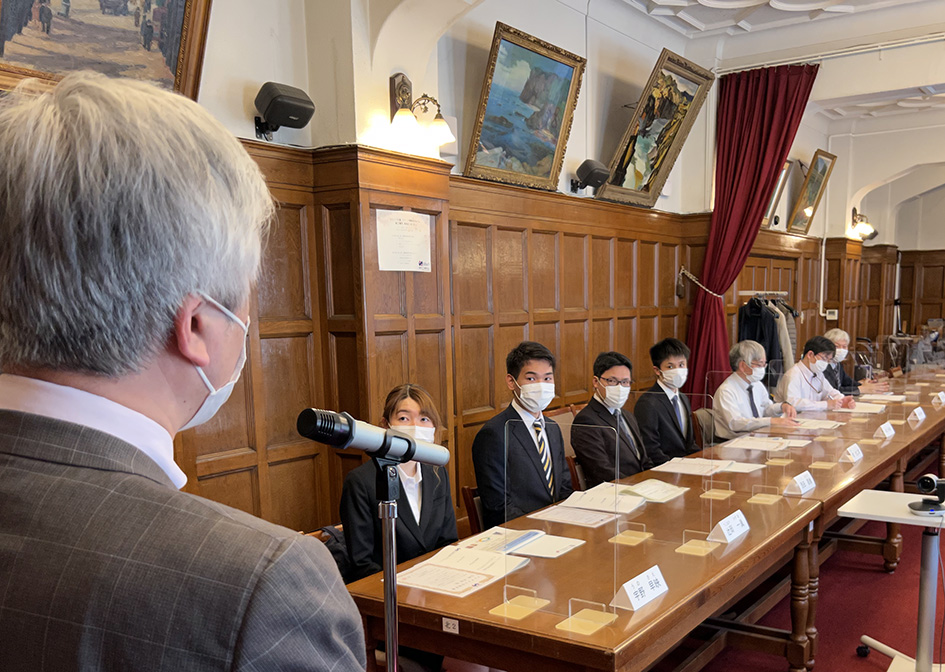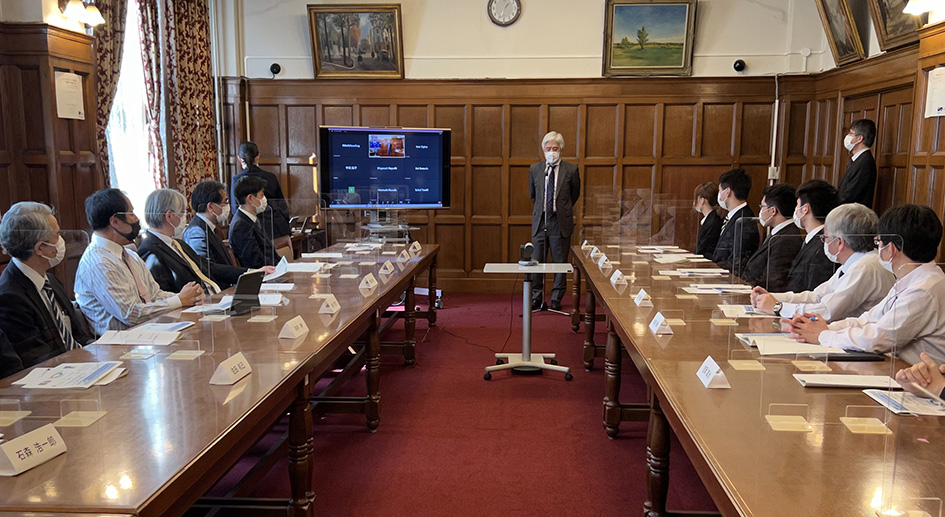2022年4月4日、2022年度北海道大学スマート物質科学を拓くアンビシャスプログラム(以下、SMatS)第2期生採用式が理学部本館大会議室にて執り行われました。このプログラムは、博士後期課程の大学院生に対して、専門分野の研究にとどまらず、スマート物質科学力ならびに社会実装実現力を養成するものです。武次徹也コーディネーターが4名のプログラム生に認定証を授与しました。
武次徹也コーディネーターの挨拶
2期生に採用されたみなさま、心よりお祝い申し上げます。総合化学院から3名、情報科学院から1名、計4名を受け入れることができ、教職員一同、大変嬉しく思っております。SMatSは北大独自の大学院博士後期課程の学生を対象としたプログラムで、令和3年度(2021年度)にスタートしたばかりです。

実は、昨年の令和3年度には様々なフェローシップ事業が北大から立ち上がりました。アンビシャスフェローシップは情報・AIとSDGsの2分野があり、さらにDX博士人材フェローシップが始まりました。その背景には、日本の科学技術力の低下に対する危機感と、若い世代を支援していく必要性があります。SMatSも教育という側面からの支援だとお考えください。
さて、スマート物質科学力を養うとどのような人材になれるかお話しします。それは北大が誇るICReDDがよい手本となるかもしれません。ICReDDは世界トップレベルの研究拠点(WPI)として2018年に採択され、研究所メンバーの一人であるベンジャミン・リスト先生が2021年にノーベル化学賞を受賞しました。ICReDDが謳っているのが情報科学と計算科学、実験科学の融合なので、従来、重要な化学反応を見つけるのに100年単位でかかっていたものを一気に加速しようという試みです。非常に挑戦的な研究といえるでしょう。

一方、SMatSは教育プログラムですがICReDDが実践している数理科学と計算科学、データサイエンスを扱う能力を養います。さらに多様な大学院生らが集まり部局横断型の教育を展開しています。1期生はこの一年間、産学官連携のDX事業に取り組みました。詳細はPh.Discoverのサイトをご覧下さい。異分野融合あるいは産学官連携という観点からも非常に参考になると思います。SMatSは博士課程のプログラムですから、受け身ではなく、自ら進んで活動に参加することを期待しています。みなさんのご健闘をお祈りいたします。
プログラム生の一人、宇野早映さんにお聞きしました。
— 今回SMatSに参加した動機を教えて下さい。
今まで、専門外のプログラムに参加したことがなかったのですが、SMatSの活動を先輩から伺ったり、ホームページを見たりして、私も研究以外の様々な体験を重ねたいと思ったからです。
— チャレンジしてみたいことを教えてください。
一つは、私の専門分野ではない計算科学のように異分野の勉強をしたいです。また、やはり産官学が連携した富良野市のDX事業の活動はおもしろそうなので、ぜひ参加してみたいと思いました。
